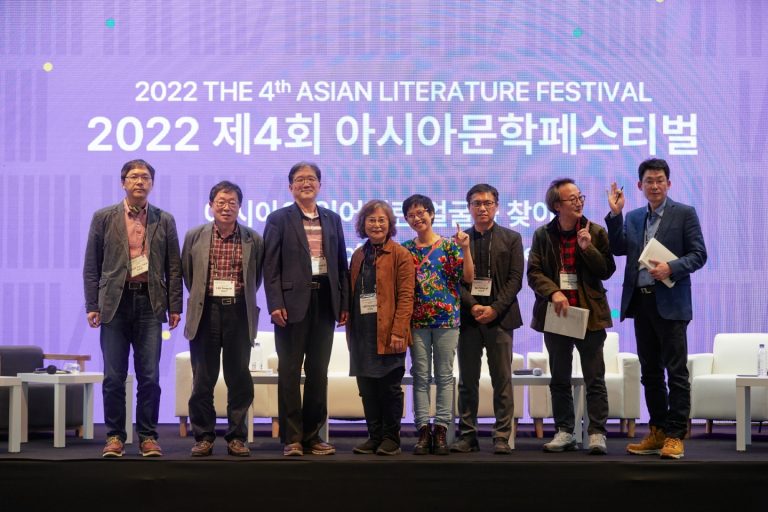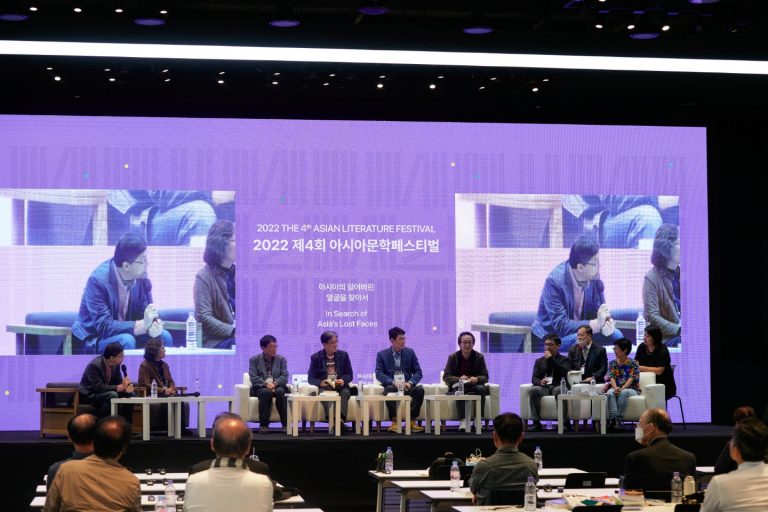
Different sessions were held in festival titled as ‘Seeing Each Other: The Lost Face’, ‘Seeing Anew: Young People in Asia’, ‘Seeing Together: A Great Transformation’, and ‘Asian Literature Award Ceremony’.
Seoul
“In Search of Asia’s Lost Faces” was the theme of The 4th Asian Literature Festival hosted by Asia Cultural Center in Gwang-ju city, Republic of Korea, which opened on Oct. 20 and ended on Oct. 24. It was followed by session 1 – ‘Seeing Each Other: The Lost Face’, session 2 – ‘Seeing Anew: Young People in Asia’, session 3 – ‘Seeing Together: A Great Transformation’, and ‘Asian Literature Award Ceremony’. This year’s festival ended with a “talk with the media” as a special session on the third day.
While Kwak Hyo-hwan, poet and a writer, had a role as a moderator during the conference, Lee Kyung-ja, novelist, Kim Yong-gil, writer and journalist of Dong-A Ilbo, Park Jong-in, journalist of Chosun Ilbo, Lee Sang-ki, publisher of THE AsiaN, Jeon Chan-il, film critic, attended as a debater.
“Asian literature is moving not to the surrounding culture but to the center of global dynamism,” they said. “In order to share each country’s community literature with each other in Asia, horizontal solidarity and culture are important.” Debaters agreed that the selection of poet Kim Si-jong, Korean residents in Japan, as the winner of the 2022 Asian Literature Awards was timely and had great implications in relation to the identity and direction of the Asian Literature Festival. The following is the gist of the press debaters’ presentation.
“Asia has long been described as the periphery of Western civilization. The West was civilized, enterprising and technological. After World War II ended, Asia entered an era of independence. From Middle East to Southeast Asia and Northeast Asia, it began to operate as a core engine for the global community. Asia is the most populous of the six continents, home to about 60 percent of the world’s 8 billion people. In particular, 1.4 billion people from China and 1.3 billion from India will be included. At the same time, Asia has an authoritarian regime. In Iran, women are protesting against hijab, and numerous young women are sacrificed. In China, dogmatism authoritarianism is strengthening with Xi Jinping’s third consecutive term. The COVID-19 containment policy is losing the support of 1.4 billion people. As such, Asia is operating both positive and negative dynamics at the same time. At this point, Asian literature is moving to the center of global dynamism, not to the surrounding culture. As it expands to high-tech productivity and production plants, it is reborn as a hot site seeking Asian solidarity and symbiotic solidarity. Now Asia is the core and largest genre of global civilization.” (Kim Yong-gil, journalist of Dong-A Ilbo)

“In order to share the literature of each country’s community in Asia, it is important to strengthen horizontal solidarity, but what is more necessary is each country’s national power based on culture.” Japan and China have long been subject to global sharing in terms of quality and quantity, including literature. Along with voluntary solidarity conducted by the mint chocolate unit, the development of the capabilities of each country’s culture itself, including literature, is an essential condition for sharing global literature. Literature is a product of reality, and there is no literature outside of reality. Resistance literature is only a genre that reflects part of reality, and through embrace and introduction of Asian values, we can promote the solidarity and spread of our own literature.” (Park Jong-in, journalist of Chosun Ilbo)
“It is timely for the Asian Literature Award to be given to poet Kim Si-jong. Here I thought about what poetry is. Poet Kim Si-jong said, “Poetry is about drawing humans.” It’s about making humanity stand out. It also says that the poet should be the ‘most advanced and most avant-garde ritual holder’. Poet Kim Si-jong said this was “a departure from the familiar daily life and at the same time a confrontation with this familiar daily life.” Kim Si-jong is in many ways connected with Lee Min-jin, the author of the novel Pachinko. In this regard, I personally appreciate the selection of Kim Si-jong as the winner of the Asian Literature Award. It is very timely and has great implications in relation to the identity and direction of the Asian Literature Festival. It can be said that Kim Si-jong’s poetry and literature world guides and stimulates other thoughts about Asian values that he has long considered.” (Jeon Chan-il, Film critic)
“Since the Asia Culture and Sports Forum hosted by the Asia Journalists Association in September 2013. At that time, reporters from 10 countries, including Singapore, Egypt, the Philippines, and Pakistan, attended and praised Gwangju’s cultural capabilities. Nine years later, the Dong-A Ilbo and Chosun Ilbo attended the event together. It can be seen that the perspective of the Gwangju Asian Cultural Center is diversifying and deepening. I think cultural activities, including literature, should go beyond ideology, ideology, and political views. I’m glad I took an important first step this time. I hope that more diverse journalists will participate in the festival of the Asian Cultural Center next year,” said Lee Sang-ki, publisher of THEAsiaN.
_______________________
Courtesy: The AsiaN, Seoul South Korea (Published on Dec. 1, 2022)